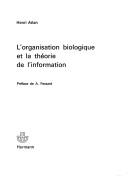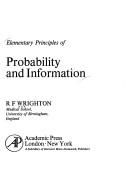| Listing 1 - 7 of 7 |
Sort by
|
Book
ISBN: 0412106906 Year: 1971 Publisher: London
Abstract | Keywords | Export | Availability | Bookmark
 Loading...
Loading...Choose an application
- Reference Manager
- EndNote
- RefWorks (Direct export to RefWorks)

ISBN: 9782020093620 2020093626 Year: 1979 Volume: S51 Publisher: Paris: Seuil,
Abstract | Keywords | Export | Availability | Bookmark
 Loading...
Loading...Choose an application
- Reference Manager
- EndNote
- RefWorks (Direct export to RefWorks)
La vie n'a pas fini de nous surprendre. Réduite à des interactions moléculaires mais étendue à des lois d'organisation inattendues, elle est aujourd'hui observée dans des systèmes vivants dont la logique interpelle et renouvelle la pensée rationnelle. Qu'est-ce que l'organisé? L'auto-organisé? Pourquoi et comment percevons-nous des ordres dans la nature, d'où viennent les significations que nous leur attribuons ? Notre psychisme, nos sociétés, objets de sciences au statut toujours aussi mal assuré, nous font penser l'organisation comme une création ininterrompue de nouveau, de sens, de vivant, entre et à partir de deux formes de morts, entre le cristal et la fumée. Les sciences de la nature, l'expérience de l'identité et de la pensée juives, la réflexion éthique forment le contexte de ces méditations sur un vivant qui déborde la biologie.
Biologie --- Entstehung. --- Leben. --- Sciences --- Systèmes auto-organisés. --- Systèmes biologiques. --- Théorie de l'information en biologie. --- complexité --- complexité. --- désordre. --- ordre. --- organisation (structure) --- organisation (structure). --- Philosophie. --- Désordre --- Ordre --- * épistémologie. --- Ordre. --- Vie. --- Biology --- Philosophy --- Philosophie

ISBN: 270561351X 9782705613518 Year: 1972 Volume: 1351 Publisher: Paris: Hermann,
Abstract | Keywords | Export | Availability | Bookmark
 Loading...
Loading...Choose an application
- Reference Manager
- EndNote
- RefWorks (Direct export to RefWorks)
Ergodic theory. Information theory --- General biophysics --- Information theory in biology --- Théorie de l'information en biologie --- Information Theory --- Biology --- Information theory in biology. --- Théorie de l'information en biologie --- Biomathematics --- Information, Théorie de l' --- Codage --- Cybernetique --- Information, traitement electronique de l'

ISBN: 0127655506 9780127655505 Year: 1973 Publisher: London: Academic press,
Abstract | Keywords | Export | Availability | Bookmark
 Loading...
Loading...Choose an application
- Reference Manager
- EndNote
- RefWorks (Direct export to RefWorks)
Ergodic theory. Information theory --- Information theory in biology --- Probabilities --- Théorie de l'information en biologie --- Probabilités --- 519.2 --- Probability --- Statistical inference --- Combinations --- Mathematics --- Chance --- Least squares --- Mathematical statistics --- Risk --- Biology --- Biomathematics --- Probability. Mathematical statistics --- Information theory in biology. --- Probabilities. --- 519.2 Probability. Mathematical statistics --- Information, Théorie de l' --- Information theory --- Information, Théorie de l' --- Probabilités
Multi
ISBN: 9781107042247 9781107650114 1107042240 1107650119 1107325366 9781107325364 1107497345 1107502888 Year: 2013 Publisher: Cambridge Cambridge University Press
Abstract | Keywords | Export | Availability | Bookmark
 Loading...
Loading...Choose an application
- Reference Manager
- EndNote
- RefWorks (Direct export to RefWorks)
Evolutionary linguistics - an approach to language study that takes into account our origins and development as a species - has rapidly developed in recent years. Informed by the latest findings in evolutionary theory, this book sets language within the context of human biology and development, taking ideas from fields such as psychology, neurology, biology, anthropology, genetics and cognitive science. By factoring an evolutionary and developmental perspective into the theoretical framework, the author replaces old questions - such as 'what is language?' - with new questions, such as 'how do living beings become 'languaging' living beings?' Linguistics and Evolution offers readers the first rethinking of an introductory approach to linguistics since Leonard Bloomfield's 1933 Language. It will be of significant interest to advanced students and researchers in all subfields of linguistics, and the related fields of biology, anthropology, cognitive science and psychology.
Developmental psychology --- Cognitive psychology --- Ethnology. Cultural anthropology --- Evolution. Phylogeny --- Linguistics --- 17.12 origins of language. --- Anthropological linguistics. --- Ethnolinguistique. --- Evolution. --- Homme --- Human evolution. --- Information theory in biology. --- LANGUAGE ARTS & DISCIPLINES --- Langage et langues --- Language and languages --- Languages. --- Origin of language. --- Théorie de l'information en biologie. --- anthropological linguistics. --- Évolution. --- General. --- Origines. --- Origin.
Periodical
Abstract | Keywords | Export | Availability | Bookmark
 Loading...
Loading...Choose an application
- Reference Manager
- EndNote
- RefWorks (Direct export to RefWorks)
Biology --- Information theory in biology --- Cybernetics --- Théorie de l'information en biologie --- Biologie --- Cybernétique --- Periodicals --- Mathematical models --- Periodicals. --- Périodiques --- Modèles mathématiques --- Bionics --- Information theory in biology. --- Bionics. --- Cybernetics. --- Bionique --- Information, Théorie de l', en biologie --- Neurophysiology. --- #ANTILTP9506 --- 57 --- Cybernetic --- Bionic --- Models, Biological --- Biological sciences in general --- Neurophysiology --- Health Sciences --- Neurology --- Healthcare Database & Medical Informatics --- Bioinformatics --- Computational Biosciences --- Zoology --- Information Technology --- Life Sciences --- Health Sciences. --- Zoology. --- Information Technology. --- Life Sciences. --- Artificial Intelligence. --- Biology. --- Mechanical brains --- Biomathematics --- Control theory --- Electronics --- System theory --- Biological control systems --- Neurobiology
Book
ISBN: 0861878957 Year: 1990 Publisher: London New York Pinter publishing
Abstract | Keywords | Export | Availability | Bookmark
 Loading...
Loading...Choose an application
- Reference Manager
- EndNote
- RefWorks (Direct export to RefWorks)
Biochemical genetics --- Biochemische genetica --- Chemical genetics --- Erfelijkheid --- Genetic translation --- Genetica --- Genetica [Biochemische ] --- Genetics --- Genetische translatie --- Génétique --- Génétique biochimique --- Heredity --- Hérédité --- Informatietheorie in de biologie --- Information theory in biology --- Theorie de l'information en biologie --- Traduction genetique --- Sociology of knowledge --- Computer. Automation --- Evolution. Phylogeny --- Artificial intelligence --- Evolution --- Evolution (Biology) --- Information theory --- Communication theory --- Communication --- Cybernetics --- Animal evolution --- Animals --- Biological evolution --- Darwinism --- Evolutionary biology --- Evolutionary science --- Origin of species --- Biology --- Biological fitness --- Homoplasy --- Natural selection --- Phylogeny --- Philosophy --- Creation --- Emergence (Philosophy) --- Teleology --- AI (Artificial intelligence) --- Artificial thinking --- Electronic brains --- Intellectronics --- Intelligence, Artificial --- Intelligent machines --- Machine intelligence --- Thinking, Artificial --- Bionics --- Cognitive science --- Digital computer simulation --- Electronic data processing --- Logic machines --- Machine theory --- Self-organizing systems --- Simulation methods --- Fifth generation computers --- Neural computers --- Artificial intelligence. --- Evolution (Biology). --- Evolution. --- Information theory.
| Listing 1 - 7 of 7 |
Sort by
|

 Search
Search Feedback
Feedback About UniCat
About UniCat  Help
Help News
News